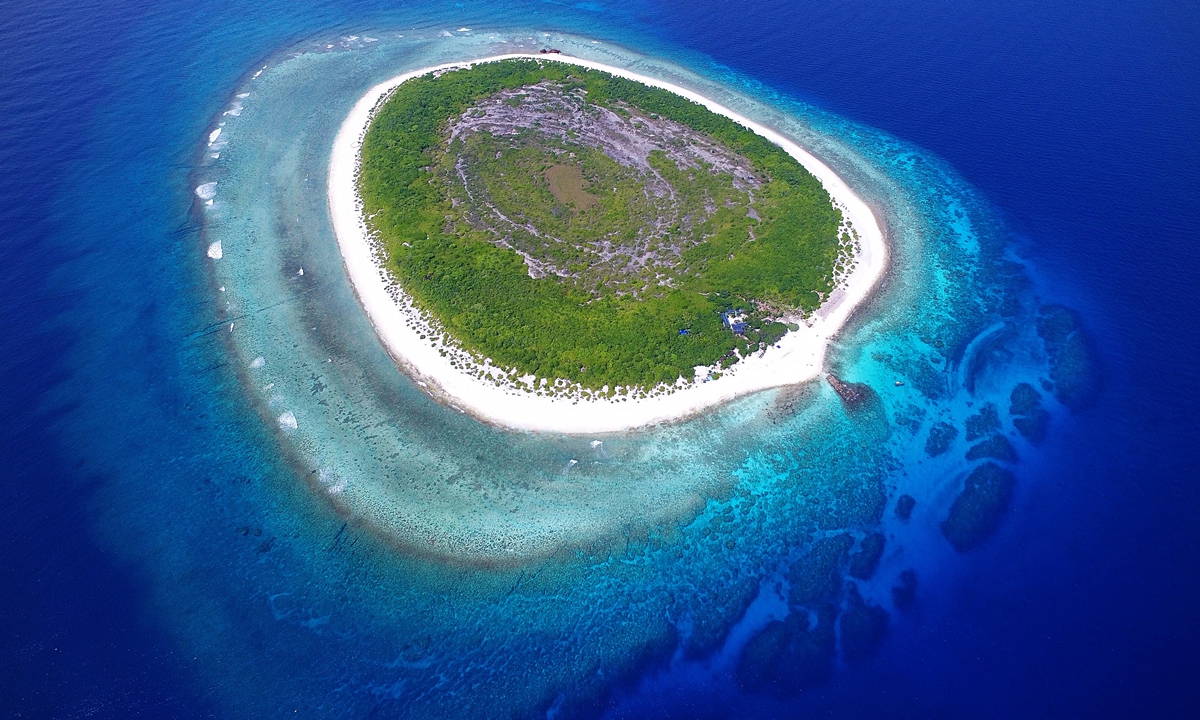
The Ganquan Island of Xisha Yongle Islands in south China's Hainan Province, April 23, 2017. Photo: Xinhua
The Ministry of Foreign Affairs of Vietnam told media on Wednesday that China's continuous military drills in the Xisha Islands, also called the "Hoang Sa Archipelago" by Vietnam, violate Vietnam's sovereignty. This is generally regarded by scholars who study Vietnam as a routine statement without special significance. However, the statement was issued the day Washington announced sanctions on 24 Chinese companies over South China Sea island construction. As a result, its public opinion effect has been enhanced.
As the US' provocative words and deeds on the South China Sea issue become frequent, such "coincidence" is bound to occur more often. This will result in a complex effect in Vietnamese society. Nationalism among the Vietnamese will pin their focus on maritime disputes and China, which may even affect Vietnam's ideology.
Some people in Vietnam hold anti-China nationalism, yet they do not pose much harm to China. Vietnam claims the Xisha Islands are Vietnamese territory, but this will only create more trouble for itself without changing the reality of the islands' ownership. The Xisha Islands have long been under China's administration, and this will last forever. It is not hard for the Vietnamese who remain rational over the South China Sea issue to come to this conclusion.
However, excessive hype on maritime issues, especially shaping Vietnam public opinion's tragic mentality may threaten the country's national security in the long run. Vietnam is a socialist country which pursues renovation and opening-up. It is inevitable for its domestic politics to face the impact of the Western value system. This is a challenge all socialist countries must deal with when opening up to the world. The results of their opening-up would differ, given the countries' different national conditions and geopolitical environment.
Experience has shown that ultra-nationalism is the easiest tool for anti-system forces in socialist countries. Ultra-liberalists and ultra-nationalists are not ideological enemies of each other. They may become allies as long as there is an opportunity. For the moment, Vietnam's ultra-nationalism makes China, not the US, a target, and it is likely to be utilized by anti-system forces, and will be encouraged and promoted by the US. Washington has made the Communist Party of China its target, calling the game between China and the US a confrontation "between freedom and tyranny." This will indirectly encourage the anti-Communist Party of Vietnam forces, increasing the difficulty for the country to maintain long-term political stability.
The US hopes to rope in Vietnam to stir up China's periphery. But the tactic is not in line with Washington's attitude toward Hanoi's political system. The domestic situation and changes in US tactics could have an impact on the stability of Vietnam's political system. If its opposition groups gain more energy, Hanoi definitely cannot count on Washington to help safeguard its system.
Many Southeast Asian countries have immature Western-style political systems. Once anti-establishment forces increase in Vietnam, their political appeal will be difficult to satisfy with a little reform within its system. If they get the upper hand, Vietnam will face turmoil. The world is not short of such lessons in recent decades.
Vietnam is enjoying economic growth and stable politics. It will be wise to fend off a potential crisis. Keeping renovation and opening-up while stemming anti-China nationalist sentiment will be of long-term significance to Vietnam. Maritime disputes should be managed by the diplomatic channels of China and Vietnam, rather than an ideological hotspot issue by Vietnam.
If Vietnam continues to resort to geopolitical leverage to resolve maritime disputes by increasing interactions with the US, it will inevitably lead to ideological consequences. China and Vietnam should deescalate maritime tensions through diplomatic ways, and prevent the issue from causing political changes within the two countries.




